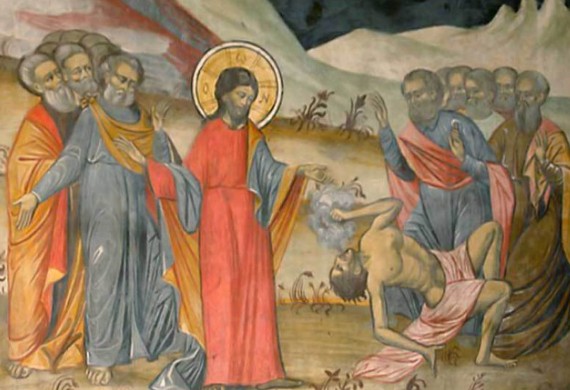Sermon on the 4th Sunday of Lent 18/3/2018
(Mark 9: 17-31)
In today’s Gospel reading, we heard the story of a father, who pleaded with the Disciples to free his son from the demonic spirit that tortured him, but they could do nothing. Later when Jesus came close to them, Jesus performed the miracle, and saved the child from Satan. After that, the Disciples asked their Master: “Why could we not cast out this demonic spirit?” And Jesus replied: “This kind cannot come out by nothing but prayer and fasting” (Mark 9:28-29).
These words of the Lord emphasize how much power prayer has in connection with fasting, so that even the most powerful demons can be cast out. Fasting and prayer are two powerful weapons for the spiritual struggle of every Orthodox believer. First, the weapon of fasting was used by our Lord Himself. As we know, the Lord fasted for 40 days without eating anything, and at the end of this fasting, He fought with Satan and defeated him. He also gave us instructions on how to fast, so that our fasting could be effective (see Matthew 6: 16-18). That is why the Church has established days of Fasting for all believers, such as Wednesday and Friday of each week and the Great Lent, which we are presently going through.
Unceasing prayer and fasting were exercised by the Saints of our Church, such as St. John of the Ladder, Abbot of the Holy Monastery of Mount Sinai, whose memory we celebrate today.
The Church has wisely defined how fasting should be done, so that it would not harm anyone’s health. (Our ecclesiastical Calendar mentions the days of fasting from meat or dairy products, etc.).
It is necessary to clarify here that fasting is not an end in itself, for example, such as love is, but it is a means of fulfilling certain goals. One may ask: “What are the goals of fasting?” Here is the reply:
• Obedience to God. Adam and Eve did not obey God and ate the forbidden fruit, and as a result, they lost Paradise. We obey the voice of God, we fast and gain Paradise.
• By depriving ourselves from some delicious food, we strengthen our will not to do what we are attracted to, yet they are not in accordance with the will of God.
• By limiting the amount of daily food and avoiding animal foodstuff, physical passions weaken and pure prayer is assisted. The Fathers of our Church say that fasting gives wings to prayer!
• By avoiding expensive food, drinks, sweets etc., and limiting ourselves to the simple food we need, we save money, which in turn we give as alms to others who cannot meet their necessities.
• Avoidance of food is also accompanied by avoidance of drinks, entertainment, and other events, so there is more time for spiritual meditation, prayer, study of the Holy Bible, reading Orthodox books that feed us spiritually.
• Finally, let us also add the advice of St. Basil the Great:
“Let us fast a kind of fasting which is pleasant to God. True fasting means alienation from evil, self-restrain of the tongue, abstinence from anger, separation of desires, gossip, lies and perjury. The lack of these is true fasting” (Homily on Fasting).
My dear brothers and sisters, fasting and prayer are characterized as heavenly gifts in the hymnology of our Church. Through these gifts, the believer becomes sanctified, he is victorious against evil spirits and remains immune to Satan’s arrows. Therefore, let us continue our fasting with more willingness and with the certainty of having a double benefit, spiritual as well as physical, according to Saint John Chrysostom. Thus, we will be worthy to worship the Holy Passion and Resurrection of our Lord with purified souls. Amen.

